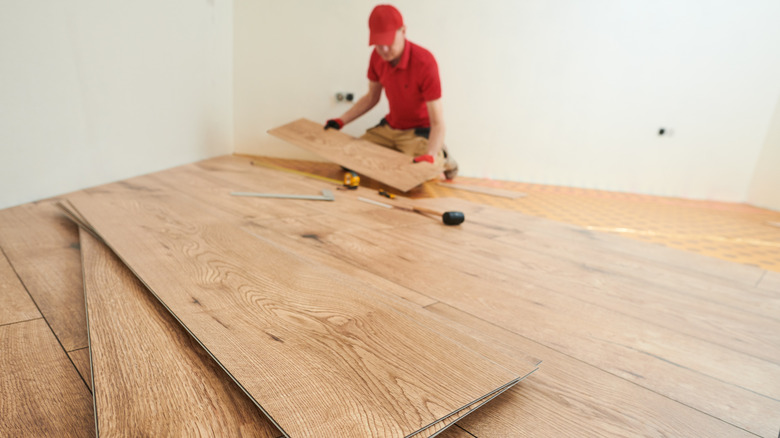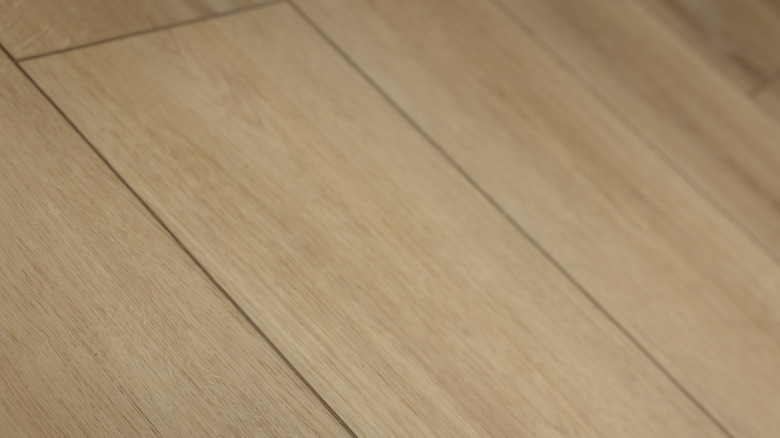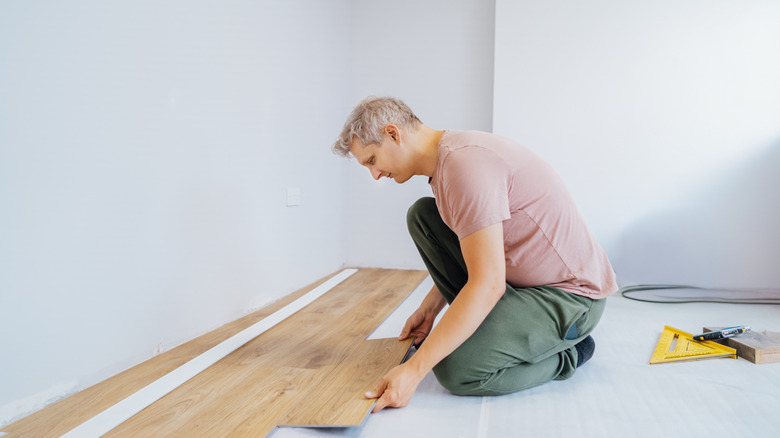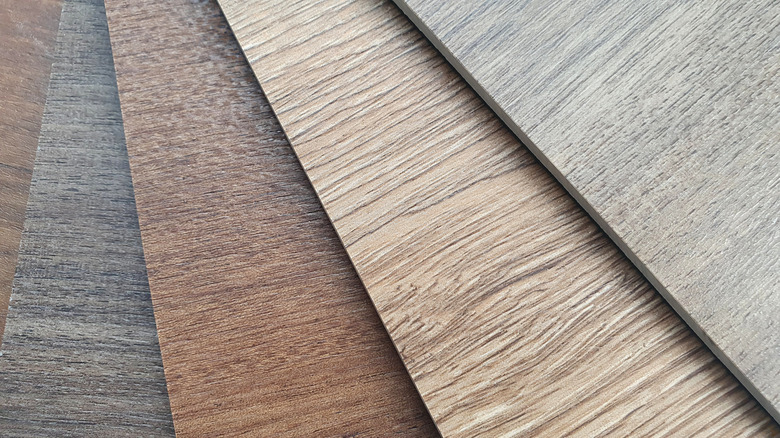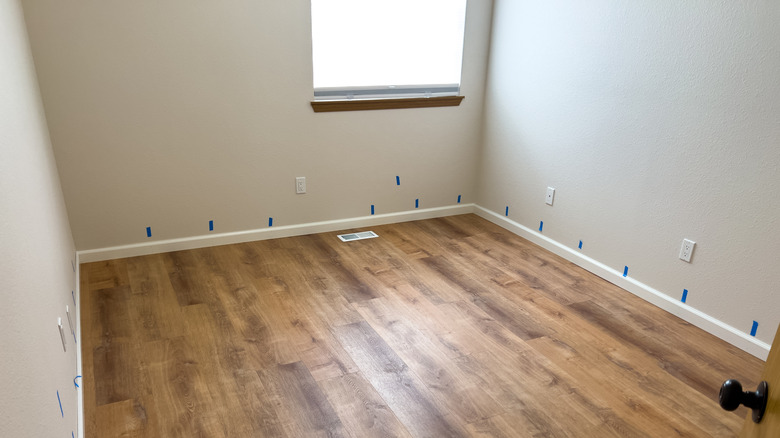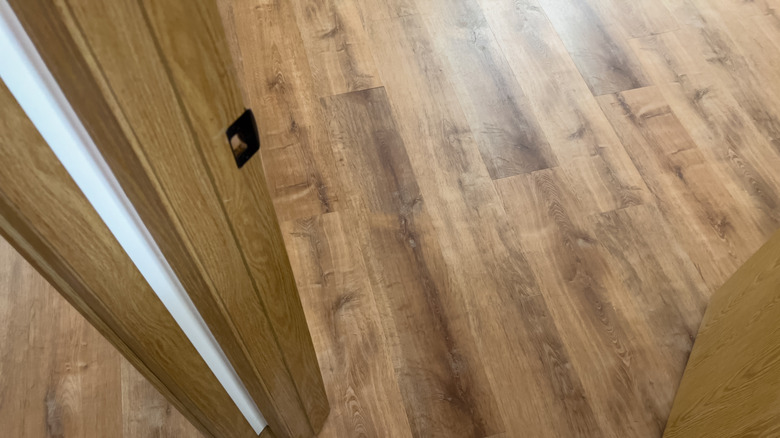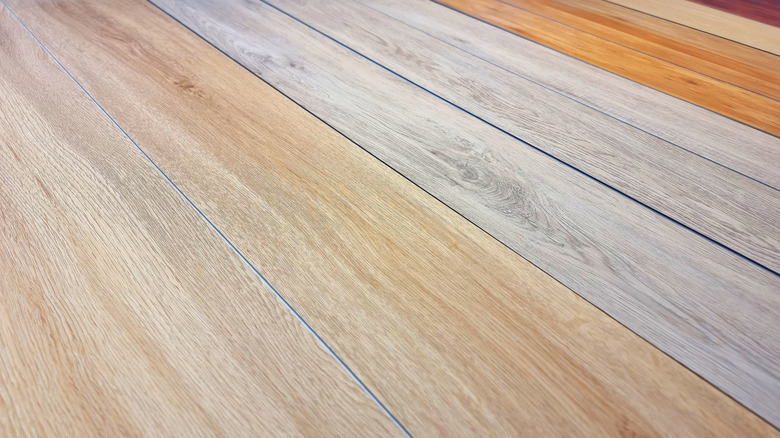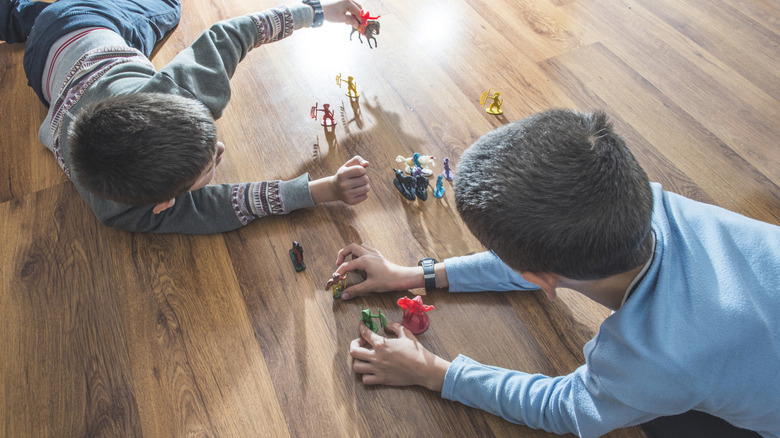Everything You Need To Know About Vinyl Plank Flooring
Vinyl plank flooring is one of the most popular options for homeowners, and according to some real estate experts, it can help make your home appealing to potential buyers. While some people may assume that its popularity is due to the fact that it can look almost identical to hardwood and can work well in a variety of spaces, those aren't the only things that this material has going for it. There are tons of pros to installing it, but there are also some things to be mindful of.
Whether you're in the market for new floors and are ready to pull the trigger on this particular material, or are simply looking to learn more information about your existing vinyl plank floors, you've come to the right place. After all, there's a lot more to vinyl plank than meets the eye. Keep reading to learn everything you need to know.
Durability is a major pro
Durability is one of the most important things to consider when it comes to choosing flooring for your home. It's also one of the biggest benefits of vinyl plank flooring. This material is known for its ability to last for a long time (and look good while doing it) because it is resilient against scratches, stains, and scuffs. In fact, if carefully maintained, it can last anywhere from 10 to 20 years. However, it's important to keep in mind that this type of longevity can only be expected from high-quality vinyl.
The durability of vinyl plank flooring makes it a great investment for homeowners — especially in areas that get a lot of foot traffic, such as entryways, kitchens, and living rooms. It's important to note that while vinyl plank flooring is considered water resistant – especially when compared to hardwood – not all options are entirely waterproof. Because of this, be sure to look for a waterproof option in wet spots like bathrooms and kitchens. In addition, while it's resistant to scuffs and stains, it doesn't fare too well with dents. Heavy furniture and even heels can create dents in the planks since the material is softer than laminate or engineered hardwood.
You may be able to DIY vinyl plank flooring installation
If you're the kind of person who loves a good DIY project, then vinyl plank flooring could be a great option for you. Installing vinyl plank flooring can be fairly easy, especially when compared to other materials such as hardwood and tile. Loose-lay vinyl plank flooring is the easiest option for DIY installation because the only thing you'll need to do is lay the planks down.
Although it is easier to install than some other materials, keep in mind that doesn't necessarily mean that it's going to be a walk in the park. One of the downsides to installing vinyl plank flooring is that you'll need to know how to cut the planks and have the right equipment to do so. Additionally, you need to be sure you have a level subfloor, or else the planks can shift and separate over time. Plus, vinyl plank flooring is porous, which means that it can expand and contract based on the environment. As a result, you'll need to acclimate your vinyl before installation by laying the planks out in the room where you plan to use them and let them sit for 48 hours. It's an important step you don't want to miss when installing vinyl.
There are different kinds of vinyl plank flooring
Versatility is another area where vinyl plank flooring shines. In addition to several color options, there are also different types of vinyl plank flooring, including loose lay, click-lock, and glue-down. Loose lay is a popular option because it can be laid without using any kind of adhesive or locking system. Each plank is able to stay in place due to its rubber backing. On the other hand, click-lock vinyl uses an interlocking system to keep each plank in place. Lastly, glue-down vinyl, as the name suggests, is installed by using an adhesive to stick the planks directly on the subfloor.
Which option works best for you will depend on your needs and whether you plan to install the floor yourself. For example, loose lay and click-lock flooring are great options for DIYers. However, if you have the budget to hire an installer, you want to go with the more involved glue-down option, since it is the most durable of the three. You also want to pay special attention to the brands you consider, since not all of them are created equally. For instance, there are a few vinyl flooring brands to avoid due to their subpar quality, one of which is NeuType. According to reviews, it has issues with chipping and scratching.
Vinyl plank flooring can be an affordable option
Cost is one of the most important things to consider when deciding on the type of flooring you want to install in your home. Vinyl plank flooring, which typically costs $1 to $5 per square foot, is a much more affordable option than other flooring materials such as hardwood, which can cost $5 to $10 per square foot, carpet, which can cost $2 to $5 per square foot, and tile, which can cost $1 to $20 per square foot. Costs can increase depending on how complex the installation is.
The low cost of vinyl plank flooring is a huge benefit, especially if you're also working on other projects in your home as it can allow you to budget more for other areas. As with many things, however, you tend to get what you pay for. Lower-cost vinyl plank flooring options may not be as durable or aesthetically pleasing.
You can't refinish vinyl plank flooring
If you've ever had hardwood flooring, you know that refinishing can essentially make the wood look brand new. This process of sanding down the wood and applying a new finish can allow hardwood floors to look great for decades. Unfortunately, refinishing isn't an option with vinyl plank flooring. Even though it's true that vinyl is fairly durable, it can still start to show its age over time, and when that happens, you'll have to replace damaged or tired-looking planks.
Since this type of flooring can last up to 20 years, some people may be okay with the fact that it can't be refinished. However, for some people, this could potentially be a deal breaker, especially if they don't want to spearhead a renovation every decade. This is also something to keep in mind if you're buying a home that has vinyl plank flooring that may be nearing the end of its life.
Vinyl plank flooring may be bad for the environment
Vinyl plank flooring is made from a synthetic plastic called polyvinyl chloride (PVC). PVC is what's responsible for vinyl being so durable, but it's also responsible for what makes it bad for the environment. Research from the Center for Environmental Health has shown that producing vinyl plank flooring releases toxins including mercury and polyfluoroalkyl substances (PFAS) into the air and that those toxins can have a negative impact on the planet's atmosphere.
If environmental friendliness is important to you, may want to go with a different flooring material. For example, stone tiles, wood, wool carpet, and ceramic tile are all eco-friendly options. However, if you're set on having vinyl, you'll be happy to know that there are PVC-free vinyl flooring options available, such as Ceramin. They have the same benefits as traditional vinyl, but they may be more expensive and more difficult to find.
Vinyl plank flooring has been linked to respiratory issues
On top of being bad for the environment, vinyl plank flooring could also potentially be bad for your health. Long-term exposure to its chemicals has been associated with respiratory issues, headaches, and other problems. A study from the Journal of Exposure Science & Environmental Epidemiology also revealed that children living in homes with vinyl flooring were more prone to develop airway inflammation and/or childhood asthma.
For some people, especially those with children, the potential health risk associated with vinyl can be a deal breaker. However, it's important to keep in mind that this isn't the only material that has been associated with possible health risks. Carpets (and rugs) can also have negative health consequences because they are known to trap dust, dirt, and other irritants. Laminate flooring also poses health risks because it contains formaldehyde. Long-term exposure to high amounts of formaldehyde can cause a wide range of issues, including skin irritation, headaches, and even cancer.
